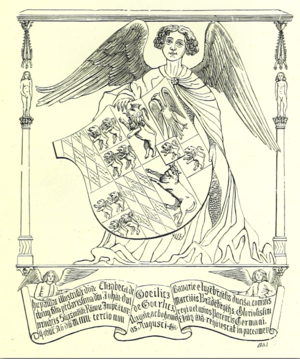Elizabeth of Görlitz facts for kids
Quick facts for kids Elisabeth |
|
|---|---|

Depiction on the tomb of Elisabeth von Görlitz, Duchess of Luxembourg, in Trier (Germany)
|
|
| Duchess of Luxemburg | |
| Reign | 1415–1419/1425–1443 |
| Predecessor | Anthony |
| Successor | Philip the Good |
| Born | November 1390 Hořovice |
| Died | 2 August 1451 (aged 60) Trier |
| Spouse | Anthony, Duke of Brabant John III, Duke of Bavaria-Straubing |
| House | House of Luxembourg |
| Father | John of Görlitz |
| Mother | Richardis Catherine of Mecklenburg |
Elisabeth of Görlitz (born November 1390 – died 2 August 1451) was an important ruler in the 1400s. She was a duchess who governed the area known as Luxembourg for many years, from 1411 to 1443.
Contents
Elisabeth's Early Life
Elisabeth was the only child of John of Görlitz. Her father was a duke and also briefly an elector, which was a powerful position in the Holy Roman Empire. Her mother was Richardis Catherine of Sweden, whose father was a king.
Becoming Duchess of Luxembourg
Elisabeth became the ruler of Luxembourg because of her uncle, Sigismund, Holy Roman Emperor. Sigismund was a very powerful king and later became the Holy Roman Emperor. He had borrowed money from Elisabeth and used Luxembourg as a guarantee. When he could not pay back the loan, Elisabeth took control of the duchy.
Her Marriages and Rule
Elisabeth married her first husband, Antoine, Duke of Brabant, in Brussels on 16 July 1409. He helped protect her rule against three rebellions by the nobles in Luxembourg. Sadly, he passed away in 1415.
Her second husband was John of Bavaria. They did not have any children together. After John died in 1425, Elisabeth found herself in a lot of debt.
Losing Control of Luxembourg
In 1441, Elisabeth made a deal with Philip III, Duke of Burgundy. She agreed that Philip could take over the management of Luxembourg right away. She also promised that he would inherit the duchy after she died. Philip agreed to this plan.
However, just two years later, Philip decided not to wait. He launched a surprise night attack on Luxembourg. His forces took immediate control of the area. Elisabeth was then forced to leave Luxembourg by Philip's army.
 | Bessie Coleman |
 | Spann Watson |
 | Jill E. Brown |
 | Sherman W. White |

